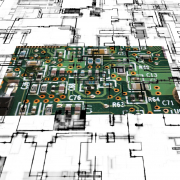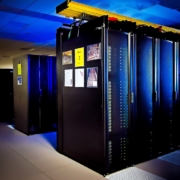Today, business owners in Northern Virginia like to say that 70% of the world’s Internet traffic passes through Fairfax and Loudon county where the “Silicon Valley of The East” is located.
While this figure cannot be perfectly substantiated, it’s true that the stretch of communities near the Dulles International Airport is widely renowned as America’s most important hub for Internet traffic and network infrastructure.
Formally known as the Dulles Technology Corridor, the cluster of data centers, businesses and government organizations which native Virginians call ‘Data Center Alley’ is increasingly favored by tech leaders throughout the U.S.
So how did things come to be this way, and why does it matter? To answer those questions, we have to go back several decades.
A History of Data Center Alley
Many of us who work in the tech industry in 2019 can remember the early days of the Internet, when a 56k modem was the hottest gear in town. That was before AOL, social media or smartphones.
But there was a time before the World Wide Web, or even Usenet boards that increasingly few of us can recall: the Internet as it existed prior to the 1980s. Back then, packet-switching networks had just been invented with ARPANET, the DoD’s TCP/IP network which connected universities across the continental United States after it was turned on in 1969.
ARPANET began as a project of the Advanced Research Projects Agency (modern day DARPA), centered in Arlington, Virginia. It was in Arlington that the Metropolitan Area Exchange, East (MAE-East) brought one of the earliest Internet Exchange Points to the Eastern seaboard, transforming Northern Virginia into the powerhouse of connectivity it is now.
After the arrival of MAE-East – and later Equinix – companies like AOL, Yahoo! and AT&T set up shop leading up to the DotCom bubble. Today, the area houses regional offices for every one of “the big five”: Microsoft, Apple, Facebook, Amazon and Google.
The Ideal Location for Data Centers
As of late 2018, the power consumption of Northern Virginia’s data center market was close to a record-shattering 1 gigawatt, showing that the importance of Data Center Alley has not decreased. In the past few years, it has become a strategic location for Cloud Service Providers (CSPs), home to four of the country’s top cloud players including Amazon Web Services (AWS), Microsoft and Digital Realty.
Aside from its history, what makes Data Center Alley ideal for new data centers? According to Loudon County head of business development Buddy Rizer, data centers require six resources to stay in good shape: power, water, fiber access, a competent workforce, proximity to resources and space to build.
Data Center Alley has them all:
- Power – Dominion Virginia Power provides most of the energy consumed by businesses in Northern Virginia. Using a combination of available and environmentally friendly sources, it provides a cost per megawatt 20% lower than the national average.
- Water – located less than an hour’s drive from the historic Potomac River, Data Center Alley has abundant municipal access to water for cooling needs.
- Fiber Access – Data Center Alley is littered with redundant fiber optic loops that provide high-speed connectivity to businesses and ISPs throughout the area.
- Competent Workforce – government contractors and tech experts from every area of specialization congregate in Northern Virginia for proximity to Washington D.C, giving data centers access to an elite and highly skilled workforce.
- Resources – surrounded by a high concentration of other businesses providing equipment, parts, and labor, the area is rich in competitively priced resources for running a data center.
- Space to build – in the past decade, 75 data centers have been opened in Loudon County alone, encompassing 10 million square feet of operating space. While the real estate market is competitive, there’s still plenty of room for expansion.
Professional Data Center Support in Data Center Alley
Located near the booming data center corridor in Loudon County, VA, Digital Tech Inc provides rapid response maintenance services including EOSL extension, spare parts, short- and long-term maintenance agreements, migration assistance and depot repair options. Our skilled engineers offer multi-vendor support, covering IBM, HP, Dell EMC, Cisco, NetApp, and many more.
To learn more, contact us today.




